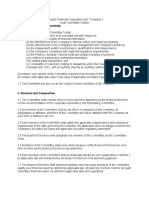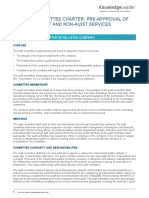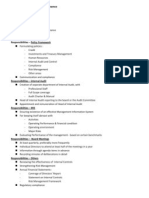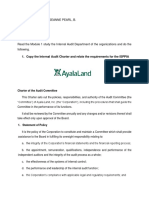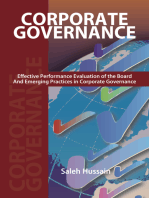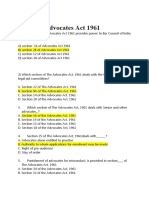Audit Committee Mandate
Audit Committee Mandate
Uploaded by
Jafar FikratCopyright:
Available Formats
Audit Committee Mandate
Audit Committee Mandate
Uploaded by
Jafar FikratOriginal Description:
Copyright
Available Formats
Share this document
Did you find this document useful?
Is this content inappropriate?
Copyright:
Available Formats
Audit Committee Mandate
Audit Committee Mandate
Uploaded by
Jafar FikratCopyright:
Available Formats
BARRICK GOLD CORPORATION
Audit Committee Mandate
Purpose
1.
The purpose of the Audit Committee (the Committee) of the Board of Directors
(the Board) is to assist the Board in its oversight of: (i) the financial reporting
process and the quality, transparency and integrity of the Companys financial
statements and other related public disclosures; (ii) the Companys internal
controls over financial reporting; (iii) the Companys compliance with legal and
regulatory requirements relevant to the financial statements and financial
reporting; (v) the external auditors qualifications and independence; and (v) the
performance of the internal audit function and the external auditor.
2.
The function of the Committee is oversight. The members of the Committee are
not full-time employees of the Company. The Companys management is
responsible for the preparation of the Companys financial statements in
accordance with applicable accounting standards and applicable laws and
regulations. The Companys external auditor is responsible for the audit or
review, as applicable, of the Companys financial statements in accordance with
applicable auditing standards and laws and regulations.
Committee Responsibilities
3.
The Committees responsibilities include:
External Auditor
(a)
retaining and terminating, and/or making recommendations to the Board of
Directors and the shareholders with respect to the retention or termination
of an external auditing firm to conduct review engagements on a quarterly
basis and an annual audit of the Companys financial statements;
(b)
communicating to the external auditor that it is ultimately accountable to
the Board and the Committee as representatives of the shareholders;
(c)
obtaining and reviewing an annual report prepared by the external auditor
describing: the firms internal quality control procedures; any material
issues raised by the most recent internal quality control review, or peer
review, of the firm, or by any inquiry or investigation by governmental or
professional authorities, within the preceding five years, respecting one or
more independent audits carried out by the firm, and any steps taken to
deal with any such issues;
(d)
evaluating the independence of the external auditor and any potential
conflicts of interest and (to assess the auditors independence) all
relationships between the external auditor and the Company, including
obtaining and reviewing an annual report prepared by the external auditor
describing all relationships between the external auditor and the
Company;
(e)
approving, or recommending to the Board of Directors for approval, all
audit engagement fees and terms, as well as all non-audit engagements
of the external auditor prior to the commencement of the engagement;
(f)
reviewing with the external auditor the plan and scope of the quarterly
review and annual audit engagements;
(g)
setting hiring policies with respect to the employment of current or former
employees of the external auditor;
Financial Reporting
(h)
reviewing, discussing and recommending to the Board for approval the
annual audited financial statements and related managements discussion
and analysis of financial and operating results prior to filing with securities
regulatory authorities and delivery to shareholders;
(i)
reviewing and discussing with the external auditor the results of its reviews
and audit, any issues arising and managements response, including any
restrictions on the scope of the external auditors activities or requested
information and any significant disagreements with management, and
resolving any disputes;
(j)
reviewing, discussing and approving, or recommending to the Board for
approval, the quarterly financial statements and quarterly managements
discussion and analysis of financial and operating results prior to filing with
securities regulatory authorities and delivery to shareholders;
(k)
reviewing and discussing with management and the external auditor the
Companys critical accounting policies and practices, material alternative
accounting treatments, significant accounting and reporting judgments,
material written communications between the external auditor and
management (including management representation letters and any
schedule of unadjusted differences) and significant adjustments resulting
from the audit or review;
(l)
reviewing and discussing with management the Companys earnings
press releases, as well as types of financial information and earnings
guidance (if any) provided to analysts and ratings agencies;
Revised December 2015
(m)
reviewing and discussing such other relevant public disclosures containing
financial information as the Committee may consider necessary or
appropriate;
(n)
reviewing and discussing with management the disclosure controls
relating to the Companys public disclosure of financial information,
including information extracted or derived from the financial statements,
and periodically assessing the adequacy of such procedures;
Internal Controls Over Financial Reporting
(o)
reviewing and discussing with management, the external auditor and the
head of internal audit the effectiveness of the Companys internal controls
over financial reporting, including reviewing and discussing any significant
deficiencies in the design or operation of internal controls, and any fraud,
whether or not material, that involves management or other employees
who have a significant role in the Companys internal controls over
financial reporting;
(p)
discussing the Companys process with respect to risk assessment
(including fraud risk), risk management and the Companys major financial
risks and financial reporting exposures, all as they relate to internal
controls over financial reporting, and the steps management has taken to
monitor and control such risks;
(q)
reviewing and discussing with management the Companys Code of
Business Conduct and Ethics and anti-fraud program and the actions
taken to monitor and enforce compliance;
(r)
establishing procedures for:
(i)
the receipt, retention and treatment of complaints regarding
accounting, internal controls or auditing matters; and
(ii)
the confidential, anonymous submission by employees of the
Company of concerns regarding questionable accounting, internal
controls or auditing matters;
Internal Audit
(s)
reviewing and discussing with management, the external auditor and the
head of internal audit the responsibilities and effectiveness of the
Companys internal audit function, including reviewing the internal audit
mandate, independence, organizational structure, internal audit plans and
Revised December 2015
adequacy of resources, receiving periodic internal audit reports and
meeting privately with the head of internal audit on a periodic basis;
(t)
approving in advance the retention and dismissal of the head of internal
audit;
Other
(u)
meeting separately, periodically, with each of management, the head of
internal audit and the external auditor;
(v)
reporting regularly to the Board and, where appropriate, making
recommendations to management of the Company and/or to the Board;
(w)
liaising with the Risk Committee of the Board, as appropriate, on matters
relevant to the Companys management of enterprise risks;
(x)
reviewing and assessing its mandate and recommending any proposed
changes to the Corporate Governance & Nominating Committee of the
Board on an annual basis; and
(y)
evaluating the functioning of the Committee on an annual basis, including
with reference to the discharge of its mandate.
Responsibilities of the Committee Chair
4.
The fundamental responsibility of the Committee Chair is to be responsible for
the management and effective performance of the Committee and provide
leadership to the Committee in fulfilling its mandate and any other matters
delegated to it by the Board. To that end, the Committee Chairs responsibilities
include:
(a)
working with the Executive Chairman and the Secretary to establish the
frequency of Committee meetings and the agendas for meetings;
(b)
providing leadership to the Committee and presiding over Committee
meetings;
(c)
facilitating the flow of information to and from the Committee and fostering
an environment in which Committee members may ask questions and
express their viewpoints;
(d)
reporting to the Board with respect to the significant activities of the
Committee and any recommendations of the Committee;
(e)
liaising with the Chair of the Risk Committee of the Board, as appropriate,
on matters relevant to the Companys management of enterprise risks;
Revised December 2015
(f)
leading the Committee in annually reviewing and assessing the adequacy
of its mandate and evaluating its effectiveness in fulfilling its mandate; and
(g)
taking such other steps as are reasonably required to ensure that the
Committee carries out its mandate.
Powers
5.
The Committee shall have the authority, including approval of fees and other
retention terms, to obtain advice and assistance from outside legal, accounting
or other advisors in its sole discretion, at the expense of the Company, which
shall provide adequate funding for such purposes. The Company shall also
provide the Committee with adequate funding for the ordinary administrative
expenses of the Committee. The Committee shall have unrestricted access to
information, management, the external auditor and the head of internal audit,
including private meetings, as it considers necessary or appropriate to discharge
its duties and responsibilities. The Committee may, in its discretion, delegate all
or a portion of its duties and responsibilities to a subcommittee of the Committee.
Composition
6.
The Committee shall be appointed by the Board annually and shall be comprised
of a minimum of three directors. If an appointment of members of the
Committee is not made as prescribed, the members shall continue as such until
their successors are appointed.
7.
All of the members of the Committee shall be directors whom the Board has
determined are independent, taking into account the applicable rules and
regulations of securities regulatory authorities and/or stock exchanges.
8.
Each member of the Committee shall be financially literate and at least one
member of the Committee shall have accounting or related financial
management expertise1. At least one member of the Committee shall be an
audit committee financial expert, as defined in the applicable rules and
regulations of securities regulatory authorities and/or stock exchanges.
For purposes of this mandate, financially literate means the ability to read and understand a balance
sheet, an income statement, a cash flow statement and the related notes that present a breadth and level of
complexity of accounting issues that are generally comparable to the breadth and complexity of issues that
can reasonably be expected to be raised by the Company's financial statements, and accounting or related
financial management expertise means the ability to analyze and interpret a full set of financial statements,
including the related notes that present a breadth and level of complexity of accounting issues that are
generally comparable to the breadth and complexity of issues that can reasonably be expected to be raised
by the Company's financial statements.
Revised December 2015
9.
If a Committee member simultaneously serves on the audit committee of more
than two other public companies, the Board shall make a determination as to
whether such service impairs the ability of such member to serve effectively on
the Committee and disclose such determination in the Companys annual proxy
statement.
Meetings
10.
The Committee shall have a minimum of four meetings per year, to coincide with
the Companys financial reporting cycle. Additional meetings will be scheduled
as considered necessary or appropriate, including to consider specific matters at
the request of the external auditor or the head of internal audit.
11.
The time and place of the meetings of the Committee, the calling of meetings and
the procedure at such meetings shall be determined by the Chair of the
Committee unless otherwise determined by the by-laws of the Company or by
resolution of the Board, provided that all matters put forward for approval by the
Committee shall be determined by majority vote.
Revised December 2015
You might also like
- Comprehensive Manual of Internal Audit Practice and Guide: The Most Practical Guide to Internal Auditing PracticeFrom EverandComprehensive Manual of Internal Audit Practice and Guide: The Most Practical Guide to Internal Auditing PracticeRating: 5 out of 5 stars5/5 (1)
- Florida General Durable Power of AttorneyDocument10 pagesFlorida General Durable Power of AttorneyTaz BratNo ratings yet
- Appointment Letter FormatDocument4 pagesAppointment Letter FormatPriti Singh100% (1)
- Berkshire Hathaway Inc. Audit Committee CharterDocument7 pagesBerkshire Hathaway Inc. Audit Committee CharterGurjeevAnandNo ratings yet
- WSP Global Audit Committee Charter ENDocument7 pagesWSP Global Audit Committee Charter ENashityadav0531No ratings yet
- Terms of Reference For The Audit Committee I.: PurposeDocument13 pagesTerms of Reference For The Audit Committee I.: PurposeJafar FikratNo ratings yet
- QBE Audit Committee CharterDocument6 pagesQBE Audit Committee CharterJiezel EstebeNo ratings yet
- Risk Committee MandateDocument4 pagesRisk Committee MandateJafar FikratNo ratings yet
- Overall Role and ResponsibilityDocument9 pagesOverall Role and ResponsibilityKyree VladeNo ratings yet
- Board Audit Committee CharterDocument13 pagesBoard Audit Committee CharterUnanimous Client100% (1)
- The Audit Risk and Compliance CommitteeDocument6 pagesThe Audit Risk and Compliance Committeecspace228No ratings yet
- Terms of Reference of Audit CommitteeDocument3 pagesTerms of Reference of Audit CommitteeApoo100% (1)
- Audit and Risk Committee CharterDocument11 pagesAudit and Risk Committee CharterKarine SNo ratings yet
- Template - 40-Audit-Committee-CharterDocument18 pagesTemplate - 40-Audit-Committee-CharterDENIS GICHURUNo ratings yet
- 4.1. Audit Committee Charter Sample 8Document4 pages4.1. Audit Committee Charter Sample 8Mohamed El-najjarNo ratings yet
- Audit Committee Charter December 2012Document5 pagesAudit Committee Charter December 2012sjmpakNo ratings yet
- Audit Committee Charter (MEGA SOFT LTD.)Document5 pagesAudit Committee Charter (MEGA SOFT LTD.)rohitgupta_arsenalNo ratings yet
- ARMCCCharterv 2Document6 pagesARMCCCharterv 2Sofia Elle Dela CruzNo ratings yet
- Audit - Committee - Charter - Tata MotorsDocument12 pagesAudit - Committee - Charter - Tata MotorsMani Vannan100% (2)
- Audit Committee Charter of Tata Motors Limited 1 Primary ObjectivesDocument7 pagesAudit Committee Charter of Tata Motors Limited 1 Primary ObjectivesPurnima SatijaNo ratings yet
- 4.3. Audit Committee Charter - Pre-Approval of Audit and Non-Audit ServicesDocument7 pages4.3. Audit Committee Charter - Pre-Approval of Audit and Non-Audit ServicesMohamed El-najjarNo ratings yet
- Audit Committee CharterDocument8 pagesAudit Committee CharterQwertyGhurl23No ratings yet
- BLK AuditCharter 093010Document6 pagesBLK AuditCharter 093010Qianli XiaNo ratings yet
- Corporate GvrnceDocument3 pagesCorporate GvrnceKopparapu BhargavNo ratings yet
- Malelang - Activity No. 1 IA CharterDocument22 pagesMalelang - Activity No. 1 IA CharterRoseanneNo ratings yet
- LEGAL-9988536-v1-Audit Committee Charter - April 2021Document8 pagesLEGAL-9988536-v1-Audit Committee Charter - April 2021AbhishekNo ratings yet
- Audit Committee CharterDocument3 pagesAudit Committee Chartermanjunath hatagaleNo ratings yet
- Corporate Governance: Casual Vacancies On The Board of DirectorsDocument3 pagesCorporate Governance: Casual Vacancies On The Board of DirectorsMalik ArifNo ratings yet
- QCOM Master Audit Committee Charter (As Approved 5-16-23)Document7 pagesQCOM Master Audit Committee Charter (As Approved 5-16-23)rmaleem084No ratings yet
- Audit Management For CooperativesDocument206 pagesAudit Management For CooperativesPatrixia Joy De GuiaNo ratings yet
- Audit CommitteeDocument15 pagesAudit CommitteeRoshni Bhatia100% (1)
- Terms Reference CommitteesDocument7 pagesTerms Reference CommitteesdfgdfgNo ratings yet
- Unit 3 CGDocument10 pagesUnit 3 CGRaja SahilNo ratings yet
- Corporate Governance of PakistanDocument2 pagesCorporate Governance of PakistanUsman RiazNo ratings yet
- Audit Committee Charter 11 8 11Document7 pagesAudit Committee Charter 11 8 11Ji YuNo ratings yet
- Audit Committee CharterDocument10 pagesAudit Committee Chartercspace228No ratings yet
- Internal & External Audit 2Document27 pagesInternal & External Audit 2Ferry Cannel100% (1)
- Audit Committee RegulationsDocument7 pagesAudit Committee RegulationscynthiayebazibweNo ratings yet
- Corporate Governance Final MCQ BookDocument77 pagesCorporate Governance Final MCQ BookFidas RoyNo ratings yet
- Cognizant Technology Solutions Corporation: Audit Committee CharterDocument7 pagesCognizant Technology Solutions Corporation: Audit Committee CharterLokeshNo ratings yet
- 2015 Internal Audit CharterDocument7 pages2015 Internal Audit CharterChessking Siew HeeNo ratings yet
- Audit CommitteeDocument3 pagesAudit CommitteeFrances Marella CristobalNo ratings yet
- Audit Committee CharterDocument6 pagesAudit Committee CharterAntekNo ratings yet
- Compensation Committee MandateDocument4 pagesCompensation Committee MandateJafar FikratNo ratings yet
- Audit and Risk Committee TorDocument4 pagesAudit and Risk Committee TorYasser BashaNo ratings yet
- MritunjayDocument6 pagesMritunjaykaydev1No ratings yet
- Auditing and Financial ReportingDocument26 pagesAuditing and Financial ReportingDivya TripathiNo ratings yet
- Pepsico, Inc. Audit Committee Charter: Committee Membership and QualificationsDocument3 pagesPepsico, Inc. Audit Committee Charter: Committee Membership and QualificationsDaniel DialinoNo ratings yet
- Appointment Independent DirectorDocument10 pagesAppointment Independent DirectorSubhasis RoyNo ratings yet
- Audit Committe & Corporate GovernanceDocument8 pagesAudit Committe & Corporate Governancesuhaib shaikhNo ratings yet
- Audit Committee CharterDocument6 pagesAudit Committee CharterNooreza PeerooNo ratings yet
- Audit - Corporate Governance PDFDocument2 pagesAudit - Corporate Governance PDFassadNo ratings yet
- Charter of The Audit Committee of The Board of DirectorsDocument6 pagesCharter of The Audit Committee of The Board of DirectorsKhalid MahmoodNo ratings yet
- Audit Committee CharterDocument6 pagesAudit Committee CharterDayarayan CanadaNo ratings yet
- TOR_FOR_ACM_ae0eedf3a5Document3 pagesTOR_FOR_ACM_ae0eedf3a5dasabhishek732No ratings yet
- No M CharterDocument4 pagesNo M CharterMark ReinhardtNo ratings yet
- Types of AuditDocument58 pagesTypes of Auditvinay saini100% (1)
- Part A, B and CDocument52 pagesPart A, B and Cayush nandaNo ratings yet
- External Auditors Policy r2Document3 pagesExternal Auditors Policy r2Lauyee LimNo ratings yet
- AC Charter October 20 2021 FinalDocument5 pagesAC Charter October 20 2021 FinalKenneth BurnettNo ratings yet
- CH 2Document4 pagesCH 2Drayce FerranNo ratings yet
- Corporate Governance - Effective Performance Evaluation of the BoardFrom EverandCorporate Governance - Effective Performance Evaluation of the BoardNo ratings yet
- Cover Letter v19.10.2017Document1 pageCover Letter v19.10.2017Jafar FikratNo ratings yet
- FffeeDocument1 pageFffeeJafar FikratNo ratings yet
- KPMG QuestionsDocument1 pageKPMG QuestionsJafar FikratNo ratings yet
- SSFSFQWDocument92 pagesSSFSFQWJafar FikratNo ratings yet
- List of Thai DishesDocument43 pagesList of Thai DishesJafar FikratNo ratings yet
- CV With PictureDocument1 pageCV With PictureJafar FikratNo ratings yet
- Terms of Reference For The Sustainability Committee I. PurposeDocument2 pagesTerms of Reference For The Sustainability Committee I. PurposeJafar FikratNo ratings yet
- II Aa Models WM 2q17Document8 pagesII Aa Models WM 2q17Jafar FikratNo ratings yet
- Create A PDF File: Exercise 1 and Exercise 2 Produce The Same Result. Choose The One That Works Best For YouDocument6 pagesCreate A PDF File: Exercise 1 and Exercise 2 Produce The Same Result. Choose The One That Works Best For YouJafar FikratNo ratings yet
- HSBC and RBS ApplicationDocument2 pagesHSBC and RBS ApplicationJafar FikratNo ratings yet
- Mandarin InternationalDocument97 pagesMandarin InternationalJafar FikratNo ratings yet
- Corporate Responsibility and Technical CommitteeDocument6 pagesCorporate Responsibility and Technical CommitteeJafar FikratNo ratings yet
- The Gmat Exam, Now With Integrated ReasoningDocument2 pagesThe Gmat Exam, Now With Integrated ReasoningJafar FikratNo ratings yet
- Governance and Nominating CommitteesDocument4 pagesGovernance and Nominating CommitteesJafar FikratNo ratings yet
- French Phonology - Wikipedia, The Free EncyclopediaDocument14 pagesFrench Phonology - Wikipedia, The Free EncyclopediaJafar FikratNo ratings yet
- Compensation Committee MandateDocument4 pagesCompensation Committee MandateJafar FikratNo ratings yet
- Europass CV 20150125 Islamli en Jafar IslamliDocument3 pagesEuropass CV 20150125 Islamli en Jafar IslamliJafar FikratNo ratings yet
- Research ProposalDocument7 pagesResearch Proposalapi-378200086No ratings yet
- Hostel Manual Part-I General Administration Chapter - 1 University Hostel Administration (UHA)Document5 pagesHostel Manual Part-I General Administration Chapter - 1 University Hostel Administration (UHA)Shivam MishraNo ratings yet
- Article 10Document2 pagesArticle 10Rachel LeachonNo ratings yet
- Supreme Courts Committee - Brooklyn Bar AssociationDocument3 pagesSupreme Courts Committee - Brooklyn Bar AssociationSLAVEFATHERNo ratings yet
- SHRI S.M. VIJAYANAND: The Modern Local Governments, Arose Out of TheDocument11 pagesSHRI S.M. VIJAYANAND: The Modern Local Governments, Arose Out of Thetej chopraNo ratings yet
- Land Titles and Deeds - Assurance FundDocument2 pagesLand Titles and Deeds - Assurance FundonlineonrandomdaysNo ratings yet
- A.C. No. 7936, June 30, 2020Document8 pagesA.C. No. 7936, June 30, 2020Christiaan CastilloNo ratings yet
- State Liabilites and Strict LiabilityDocument2 pagesState Liabilites and Strict LiabilityAdarsh AdarshNo ratings yet
- Torts NotesDocument6 pagesTorts NotesAbhinav ChandrachudNo ratings yet
- G.R. No. 179736 June 26, 2013 Spouses Bill and Victoria Hing, Petitioners, Alexander Choachuy, Sr. and Allan CHOACHUY, RespondentsDocument4 pagesG.R. No. 179736 June 26, 2013 Spouses Bill and Victoria Hing, Petitioners, Alexander Choachuy, Sr. and Allan CHOACHUY, RespondentsMichael Mendoza MarpuriNo ratings yet
- Deutsche Bank AG Manila Branch v. Commissioner of Internal Revenue, G.R. No. 18850, August 19, 2013Document2 pagesDeutsche Bank AG Manila Branch v. Commissioner of Internal Revenue, G.R. No. 18850, August 19, 2013Dominique VasalloNo ratings yet
- Resa and Its IrrDocument79 pagesResa and Its IrrEarl Russell S PaulicanNo ratings yet
- MCQ On Advocates Act 1961Document3 pagesMCQ On Advocates Act 1961anurag aroraNo ratings yet
- Babubhai and Ors. Vs State of GujaratDocument1 pageBabubhai and Ors. Vs State of GujaratUrviNo ratings yet
- Jimenez v. RabotDocument5 pagesJimenez v. RabotCarie Lawyerr100% (1)
- Federalism DA - SymondsDocument114 pagesFederalism DA - SymondsAffNeg.Com100% (2)
- Rechtbank Rotterdam - V.L.M. Pabst-ThissenDocument1 pageRechtbank Rotterdam - V.L.M. Pabst-Thissenopenbaar minNo ratings yet
- Ghosts of MississippiDocument3 pagesGhosts of MississippiCrystal Dawn RobyNo ratings yet
- VAT On Works ContractsDocument18 pagesVAT On Works ContractsSandesh Mundra100% (1)
- Atticuss Closing SpeechDocument3 pagesAtticuss Closing Speechjaleesa minorNo ratings yet
- Chapter 12X Policy Alternatives MemoDocument16 pagesChapter 12X Policy Alternatives MemoJoe EskenaziNo ratings yet
- Chung Fu Industries Inc vs. CA - 206 SCRA 545Document4 pagesChung Fu Industries Inc vs. CA - 206 SCRA 545JoyceNo ratings yet
- CE LAWS (Prelim Exam Reviewer)Document6 pagesCE LAWS (Prelim Exam Reviewer)qmaquiranteNo ratings yet
- Organized Crime and Central American Migrant Report From UTDocument54 pagesOrganized Crime and Central American Migrant Report From UTChivis MartinezNo ratings yet
- Portfolio-English-Ix Procesos Itzel Montserrat Ramirez GodinezDocument24 pagesPortfolio-English-Ix Procesos Itzel Montserrat Ramirez GodinezItzel RamírezNo ratings yet
- 05.2 - Do 198-18 SV NCRDocument32 pages05.2 - Do 198-18 SV NCRJoseph CabreraNo ratings yet
- Credit Transactions Sarona First ExamDocument77 pagesCredit Transactions Sarona First ExamCnfsr KayceNo ratings yet
- FERNANDO Finals Corporation LawDocument7 pagesFERNANDO Finals Corporation LawFay FernandoNo ratings yet








